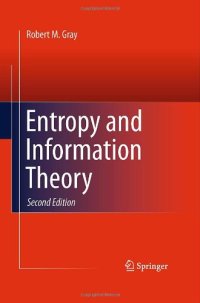
Ebook: Entropy and information theory
Author: Robert M. Gray (auth.)
- Tags: Signal Image and Speech Processing, Communications Engineering Networks, Statistics for Engineering Physics Computer Science Chemistry and Earth Sciences, Probability Theory and Stochastic Processes, Coding and Information Theory
- Year: 2011
- Publisher: Springer US
- Edition: 2
- Language: English
- pdf
This book is an updated version of the information theory classic, first published in 1990. About one-third of the book is devoted to Shannon source and channel coding theorems; the remainder addresses sources, channels, and codes and on information and distortion measures and their properties.
New in this edition:
- Expanded treatment of stationary or sliding-block codes and their relations to traditional block codes
- Expanded discussion of results from ergodic theory relevant to information theory
- Expanded treatment of B-processes -- processes formed by stationary coding memoryless sources
- New material on trading off information and distortion, including the Marton inequality
- New material on the properties of optimal and asymptotically optimal source codes
- New material on the relationships of source coding and rate-constrained simulation or modeling of random processes
Significant material not covered in other information theory texts includes stationary/sliding-block codes, a geometric view of information theory provided by process distance measures, and general Shannon coding theorems for asymptotic mean stationary sources, which may be neither ergodic nor stationary, and d-bar continuous channels.
This book is an updated version of the information theory classic, first published in 1990. About one-third of the book is devoted to Shannon source and channel coding theorems; the remainder addresses sources, channels, and codes and on information and distortion measures and their properties. New in this edition:Expanded treatment of stationary or sliding-block codes and their relations to traditional block codesExpanded discussion of results from ergodic theory relevant to information theoryExpanded treatment of B-processes -- processes formed by stationary coding memoryless sourcesNew material on trading off information and distortion, including the Marton inequalityNew material on the properties of optimal and asymptotically optimal source codesNew material on the relationships of source coding and rate-constrained simulation or modeling of random processesSignificant material not covered in other information theory texts includes stationary/sliding-block codes, a geometric view of information theory provided by process distance measures, and general Shannon coding theorems for asymptotic mean stationary sources, which may be neither ergodic nor stationary, and d-bar continuous channels.
Download the book Entropy and information theory for free or read online
Continue reading on any device:

Last viewed books
Related books
{related-news}
Comments (0)